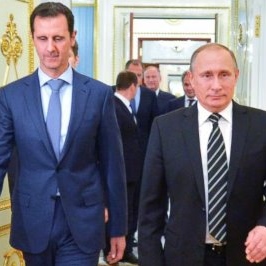click to dowload our latest edition
CLICK HERE TO SUBSCRIBE TO OUR NEWSLETTER


Published
6 years agoon
By
adminPAULA SLIER
The irony is that as the war there (seemingly) winds down, so does the partnership between the two, start to unravel. While this might at first glance seem good news for Jerusalem, neither is a particularly ideal option. However, an Iranian-controlled Syria would certainly be worse for the Jewish State.
The Iran-Russia partnership was never a match made in heaven. Rather, Syria merely provided the perfect battleground for both countries’ interests. Tehran sent disciplined ground troops to complement Moscow’s first-rate air power and together they saved the Syrian state from almost certain collapse.
Tehran and Moscow are both intent on blocking American influence and have found themselves at different times isolated. Tehran was isolated in light of sanctions imposed on her because of her nuclear programme, while Russia because of her actions in Crimea and Ukraine. This inevitably brought them closer together, especially militarily.
At the same time, Russia is helping Iran build her nuclear facilities – two new units will be built at the Bushehr nuclear plant over the next 10 years, totalling some 10 billion dollars.
In an unprecedented move, last year Russian planes used an Iranian airbase to conduct operations in Syria. And if this is not enough to convince of the growing ties, the countries have signed multi-billion dollar arms deals, although Tehran has accused Moscow of stalling in providing weapons.
But beyond the headlines, the relationship between them is tense and dogged by complexity and mutual distrust. For decades, they have been wary of each other’s intentions and despite growing closer together, leaders on both sides are cautious.
Historically, Moscow and Tehran have fought over land with Russia controlling former Iranian territories like Armenia. They also compete against each other in global energy markets.
What’s more, Moscow is trying to build relations with Iran’s enemies, the Gulf’s Arab monarchies, as she takes advantage of the US administration’s withdrawal from the region. Hence, Moscow is left weighing the financial and diplomatic benefits of arms sales to Tehran.
Voices inside Iran are also cautioning against closer relations with Russia. Iranian President Hassan Rouhani’s moderate government has campaigned for a more balanced foreign policy – and it was this that eventually secured the UN-sanctioned nuclear deal.
And yet, although they were not natural bedfellows, the Russian-Iranian partnership served its purpose in Syria.
Now as both countries negotiate the future of that country, they are vying for dominance and Russia has taken several steps toward decreasing Iran’s influence: deploying military police, establishing the de-escalation zone, supplying weapons and equipment to prop up those forces under Russian control.
Moscow is aware that Iran uses Hezbollah, the Shia Islamist political party and militant group based in Lebanon, as part of its plan to establish a ground corridor from Iran to the Mediterranean Sea. This is not something that sits well with the Russians, who are keen on limiting Iran from becoming too powerful.
But although the rivalry exists, Jerusalem shouldn’t get too excited over it. Russian Foreign Minister Sergey Lavrov last week called the Iranian presence in Syria “legitimate” and said Russia had not committed itself to the withdrawal of pro-Iranian forces from the country.
Iranian forces now maintain a presence close to, or adjoining, the Israeli-controlled portion of the Golan Heights and the Quneitra Crossing that separates it from the Syrian-controlled portion of the territory.
A trilateral ceasefire agreement that was recently signed between Russia, the United States and Jordan, stated that all foreign forces in southern Syria, which include the Iranian Revolutionary Guards and Shi’ite militias operating at the direction of Tehran, will be required to leave the country, but it did not provide a timetable.
The agreement also required that the Iranians and the militias remain only a relatively short distance away from Israel’s Golan Heights border. Israeli Prime Minister Benjamin Netanyahu said this week that Israel is not bound by this agreement and Defence Minister Avigdor Lieberman warned that Israel would not sit back and allow Iran to entrench itself in Syria.
But aside from involving herself in another war, what can Jerusalem really do? She may demand that Iran leaves Syria but Russia gets to set the rules in this game and it’s clear that that’s not the card they’re playing.
Moscow has already allowed the Israeli air force considerable latitude in conducting airstrikes in Syria that target Hezbollah. This no doubt infuriates the Iranians, which the Russians are all too aware of.
It’s doubtful Moscow would ever go so far as to marginalise Tehran in Syria and for this reason the Israelis must be careful not to overstep their mark because ultimately Moscow could severely limit her freedom to act inside Syria.
Paula Slier is the Middle East Bureau Chief of RT, the founder and CEO of NewshoundMedia and the inaugural winner of the Europcar Woman in Leadership Award of the South African Absa Jewish Achievers.
